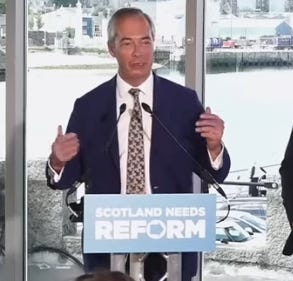Reform lost Hamilton but arrived in Scotland
Labour won a surprise victory over the SNP but Reform’s vote was the story of the night
If the Scottish political classes had hoped to wipe the grin from Nigel Farage’s face last night, they failed. From nowhere, Reform turned the Hamilton, Larkhall and Stonehouse by-election into a three-way marginal on a 26% swing. Farage remains the man they love to hate in much of Scotland, but his party is now a significant player – even after recklessly playing the race card.
Labour are understandably jubilant at winning, despite having a candidate, Davy Russell, so inarticulate they had to keep him away from the cameras. But they shouldn’t delude themselves that they have sent Reform “home to think again”. This was, in many ways, the moment that Nigel Farage’s party arrived in Scotland.
We always say that elections are “the only poll that matters”, and on that basis Reform have done well. They returned a share of the vote that is significantly greater than the 19% they have been recording in Scottish opinion polls. That was enough to place them, analysts said, in contention with Labour as the likely opposition after next year’s Scottish Parliament elections. Now, anything is possible.
Indeed, Reform may even have cause to be grateful for coming third this time behind the SNP. They are really in no position right now to present themselves as a potential party of government in Scotland. Their policies are hopelessly confused on key issues like the Barnett Formula, which Nigel Farage suggested in Aberdeen should be scrapped. No one is going to win in Scotland on a platform of radically reducing Scottish public spending. Farage is still widely regarded in Scotland as an English nationalist, and this didn’t help.
Reform’s campaign in Hamilton was ill-judged and concentrated too much on immigration and race. The attack ads claiming that the Scottish Labour leader, Anas Sarwar, intended to prioritise the Pakistani community may or may not have been “obviously racist”, but they dominated the campaign. This diverted attention from Reform’s other more popular policies, like fully restoring the Winter Fuel Payment and ending the two-child benefit cap.
Reform are not the only party in Scotland arguing that net zero is costing Scots dear in fuel bills, despite all the supposedly cheap green energy off Scotland’s shores. However, the Tories are too compromised on energy to convincingly challenge Ed Miliband’s apparent atrempt to collapse Scotland’s oil and gas industry. It was after all Boris Johnson who launched the dash for Net Zero. This should have been Reform’s key economic pitch.
Nor did Reform fully capitalise on being the “anti-woke” party. John Swinney says he still supports Nicola Sturgeon’s hated Gender Recognition Reform Bill – and his government is still formally committed to legislating a ban on so-called “conversion therapy”, which many Scottish feminists regard as an attempt to legally enforce “gender affirmative care”. But trans issues were largely absent from the campaign. This may have been a relief to those of us who have had enough of LGBT-bashing, but it was a missed opportunity for a populist party campaigning in a socially-conservatice mainly working class community.
Reform may have induced a handful of mainly Tory councillors to defect, but it remains a pretty ramshackle excuse for a party in Scotland. They still have to import activists from south of the Border. They were lucky to get as many of the “scunnered” folk of Hamilton to the polling booths as they did. Labour threw everything at this by-election end their strength in numbers really mattered.
Many SNP voters stayed at home. At least that is how the nationalists are spinning the loss of this seat which the late Christina McKelvie held with a 4,500 vote majority. John Swinney may have cause to regret claiming that Hamilton was a “two horse race between the SNP Reform”.
You always felt during this campaign that Reform were on alien territory and couldn’t quite believe their own opinion polls. This is hardly surprising since they have very little history in Scotland and have struggled to present themselves as a potential party of government in Scotland. But the votes are there for the taking. There are a million former Brexit voters in Scotland, and if Reform can get a chunk of them to the polling stations next year, they may return a significant bloc of MSPs to the Holyrood parliament.
What it will do with them is unclear. Immigration aside, Reform’s policies are inchoate to say the least. Their top task now is to answer the oldest question in politics: what are you there for?




There are one million former Brexit voters but there are at least as many who are deeply frustrated with the way Scotland (and the UK) are being run, and not entirely without reason.
Where do these voters go to voice their disapproval? Not the SNP, who have been in power at Holyrood for a generation. Not the Conservatives, who were in charge at Westminster for a chaotic 14 years. Not Labour who are looking utterly ineffectual. And not the Lib Dems or Greens who, in slightly different ways, radiate establishment vibes.
The English feel to reform will likely mean that they have a lower ceiling in Scotland. However, process of elimination should make sure they pick up enough protest votes to collect a serious number of regional list seats.
“. . . many Scottish feminists regard [a ban on conversion therapy] as an attempt to legally enforce “gender affirmative care””
Not just Scottish feminists, Iain, but women everywhere. No ban on conversion therapy is needed as it’s no longer used to ‘cure’ gay people. It’s solely to push trans ideology and any woman worth her salt will be against that.